Elizabeth Silverberg
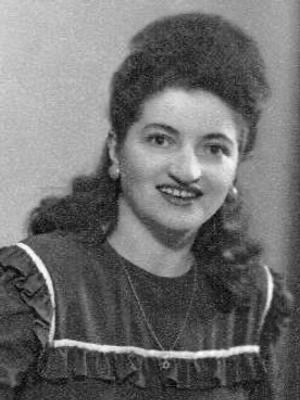
Born: Slatinské Doly, Czechoslovakia (now Solotvyno, Ukraine), 1928
Wartime experience: Ghetto and camps
Writing Partner: Bev Birkan
Elizabeth Silverberg (née Erzsébet Eisikovits) was born in Slatinské Doly, Czechoslovakia (now Solotvyno, Ukraine), in 1928. She grew up in a large family with eight siblings, five of whom survived the Holocaust.
In 1939, the region her family lived in came under Hungarian rule, and in March 1944, when Germany occupied Hungary, Elizabeth and her family were subject to anti-Jewish laws and persecution. Two of Elizabeth’s brothers were sent to forced labour battalions, and in April, Elizabeth and the rest of her family were sent to a ghetto in Sighet (now Sighetu Marmației, Romania). In May, they were taken to Auschwitz-Birkenau. Two months later, Elizabeth was deported on to Breslau-Hundsfeld, a subcamp of the Gross-Rosen concentration camp. When the camp was evacuated in January 1945, Elizabeth was sent to the Bergen-Belsen concentration camp, where she had to work on a burial squad. Elizabeth was liberated by the British army on April 15, 1945. She lived in displaced persons camps in Germany for more than three years before immigrating to Canada in January 1949. In Toronto, Elizabeth worked in a garment factory and went to night school to learn English; there, she met her husband, Leo, a Holocaust survivor from Łagów, Poland. They married in 1950 and raised a family while Leo continued working in the garment industry. Leo Silverberg passed away in 1997; Elizabeth Silverberg passed away in 2018.
My Mother’s Legacy
My story is one of survival. You will see that I went through a lot and survived unspeakable horrors. I was very lucky to survive when so many others didn’t. My children tell me that I am truly a survivor — not only lucky but also strong, tenacious, and fiercely independent, with a sharp wit. These qualities, together with a lot of good fortune, have allowed me to live the life that I do today and have the wonderful family that I have.
We had a good life growing up. My father was a cattle dealer, buying and selling. We weren’t rich, but my father made a living. My mother had some help — with so many children, she needed help. A woman would come in each day to help clean and wash laundry. There was lots of work for women because there were no machines to help with these kinds of tasks.
We owned our own home with several bedrooms, a living room, a dining room, a regular kitchen plus an outdoor summer kitchen and a large pantry. We had a very large table in the dining room, big enough to seat the whole family. We shared the bedrooms, with two double beds in each room.
Our family celebrated Shabbat and all the yom tovim (Jewish holidays) with a large family meal. My older sisters would help my mother prepare different dishes, and we all gathered together — eating, drinking, talking, playing and having a good time. My mother was an excellent cook and would explain how to make some dishes and the reason why we ate certain foods. I still make many of those dishes for my family. We ate carrots for a good parnossah (to make a good living) and farfel, a type of egg noodle pasta, so that God would forgive us our sins. I enjoyed watching her cook, as well as helping, and I learned a great deal from her. We had to make everything from scratch. We made and braided our own challahs. We frequently made our own lokshen, noodles. When I was in the camps, I remembered the taste and that kept me going. Our imagination can help us out sometimes.
After lunch the children would have a potluck party with all the children bringing different snacks or candy to share with one another. This was our entertainment. We didn’t have much in the way of toys, but I do remember I had a doll. I enjoyed sewing by hand and loved making clothes for her. I even remember making her a purse. When I played with my friends, we would play with things from around the house. We’d play hopscotch using stones or buttons. We would also play with marbles. We had to be creative and use things that were easy to make or cheap to buy.
The community cared for one another. We made sure that no one lacked for anything. We took care of the poor in the town, making sure everyone had the necessities for Shabbat and for the rest of the week. If someone lacked something, someone else would provide what was needed.
I went to school until about Grade 4 or 5. I loved school and I loved learning. I had always wanted to be a history teacher. Fortunately, I have been able to realize this dream by teaching my children, grandchildren and Canadian teens by sharing my stories. I also take great pleasure in the fact that all my children and grandchildren have been able to pursue their dreams.
I loved school and I loved learning. I had always wanted to be a history teacher. Fortunately, I have been able to realize this dream by teaching my children, grandchildren and Canadian teens by sharing my stories.
Close to Death
In Bergen-Belsen, I was part of the Leichenkommando, the corpse, or burial, squad. My job was to help three other girls carry the bodies of the dead to a mass grave. The body was placed on a blanket and each girl picked up one of the four corners. It was a very physically and emotionally difficult task. The hardest part was seeing and carrying the bodies of many of my friends who had not survived.
The food was almost non-existent. We had a choice between bread and extremely watery soup. I always took the bread. It seemed to have more substance than the watery soup. My cousin Feige, who was also in the camp, would always choose the soup. I tried to convince her to take the bread, but she had her preference. Sometimes she even traded away her bread. Unfortunately, she did not survive.
To help pass the time and keep our spirits up, we would talk about the good times at home before the war and about our hopes for the future after we were liberated. We talked about the food we had eaten, the special meals we had for Shabbat and the yom tovim. I remembered the meanings my mother had given me for eating farfel and carrots. Once we were liberated, I wanted to always have a loaf of rye bread on the table and at least two dresses in my closet.
While I was in Bergen-Belsen, I also suffered from typhus. At one point I was so sick that I was semi-conscious for twelve days. I remember a couple of Jewish Polish girls staying with me, crying, “Don’t die, you’re too young!” They kept repeating those words. One of the girls asked if there was something she could get me, and I said that I wanted a teaspoon of cottage cheese. I don’t know how she did it, but she managed to get me some cottage cheese. So many times I was close to death and somehow managed to survive. Fortunately, there were some good people near me who helped me get through.
There were constant rumours about liberation coming shortly, that the Germans were being defeated and the war was coming to an end. Unfortunately, liberation came too late for so many. People were encouraging others to try to stay alive, telling them that we would soon be free.
One day I saw German soldiers, running around the camp and grabbing whatever valuables they could — gold watches, furniture and other items — then leaving by the open gates. Other German soldiers remained to guard us. It was very confusing.
I went to find my sister Feige to ask what was happening. We weren’t in the same bunk, and a couple of my sisters were in another barracks. I ran into Feige’s barracks and said “Feigele, are they coming for us?” She replied, “No, they’re going to liberate us.” She was mature and understood the situation better than I did.
Bergen-Belsen was officially liberated by the British on April 15, 1945. People who were strong enough were running around the camp trying to find food. I went into one of the storerooms and found a barrel of sauerkraut. I was so hungry that I reached into the barrel to eat whatever I could grab and, as I reached in, I fell into the barrel and couldn’t get out. So I stayed in the barrel and continued to eat the sauerkraut. I just ate and ate and ate. I shouldn’t have done it — I wasn’t in good shape to begin with, and eating the sauerkraut made me extremely sick. Once again, just as we were being liberated, I found myself close to death.
I couldn’t get out of the barrel. Finally, a British soldier came to rescue me. He was crying and I was crying. He was crying because of the horrors that he witnessed when he entered the camp. He couldn’t understand the cruelty that had been perpetrated against us. There were many unburied bodies in piles around the camp and most of the people still alive were emaciated, weak, sick and in need of urgent care.
A rabbi joined the soldiers who liberated the camp. I remember him saying Kaddish, the Jewish mourner’s prayer, and the El Maleh Rachamim memorial prayers for those who had died. He tried to bring some comfort to us.
In the following days I became so sick that I couldn’t walk. I was placed in an infirmary with many other sick people. On every day after liberation, hundreds of people died. I believe that some of it was the fault of the English, but it was not intentional. They gave out food that was not suitable for survivors who were nothing but weak and emaciated skeletons trying to stay alive. They gave us food that our malnourished bodies couldn’t digest. The food was too rich, with too much fat. People were starving and didn’t know any better. Everyone just wanted food — Essen! Essen! Essen! That was the cry on the lips of so many people. In spite of the best efforts of the liberating forces, thousands of people died after liberation.
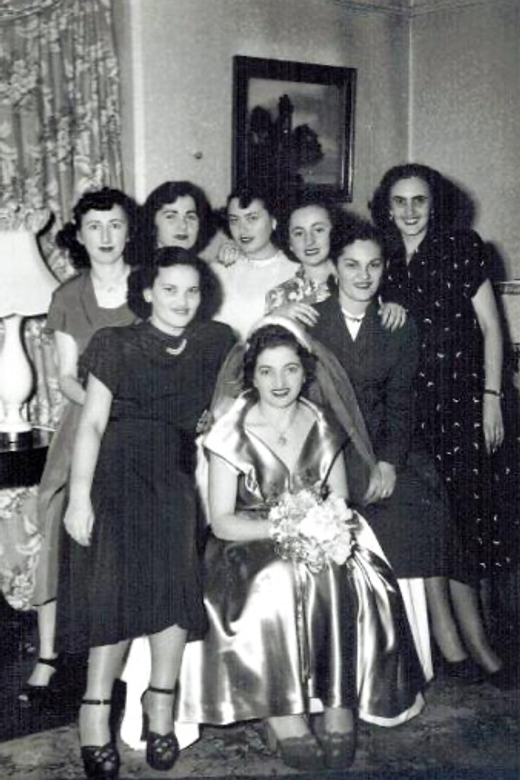
Elizabeth at her wedding with friends and some of her ship sisters, who were on the voyage with her to Canada. Toronto, September 23, 1950.
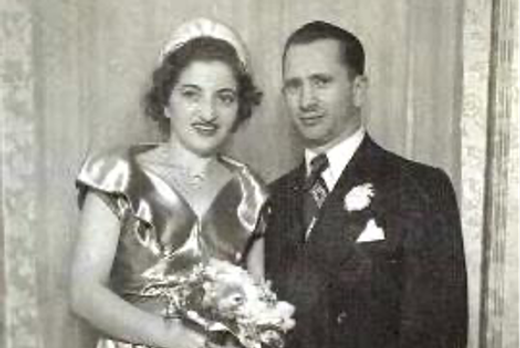
Elizabeth and Leo’s wedding. Toronto, September 23, 1950.
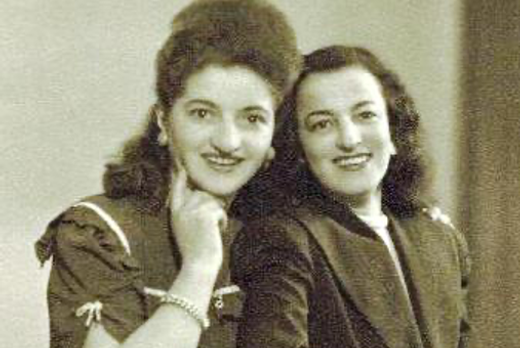
Elizabeth (left) with her cousin Freida after the war. Toronto, 1949.
Finding Home
In January 1949, I boarded the SS Marine Jumper, a military ship that would take us to Pier 21 in Halifax. There were several other girls on the ship, and we called ourselves “the ship sisters.” During the entire voyage, we all suffered from sea sickness. The girl in the bunk above me was crying in pain. I told her that I would come to help her. Just as I got up to help her, though, I fell down with the illness. I heard that the food on the ship was very good but unfortunately, I was unable to eat.
By the time I arrived in Canada on January 20, I couldn’t stand up. The crew had to take me off the boat on a stretcher. Fortunately, after settling on dry land for a short time, I was able to stand up and get my bearings. We were given a choice to settle in Montreal or Toronto. I didn’t know of any relatives in Canada, so I chose to go to Toronto. The “ship sisters” stayed in touch for many years as our families grew. Several attended my wedding.
I was taken in by a very kind and generous woman named Mrs. Winter, who had previously opened her door to another Jewish orphan. Her daughters were grown up and married, and her husband was a travelling salesman and was often on the road. She rented part of a duplex on Euclid Avenue near College Street. When an orphan staying with her got married, she would invite another one to stay in her home. She took in and married off three orphans, of whom I was the second.
A friend of Mrs. Winter had a factory that made sports jackets and she was able to get me a job that paid about fifteen cents an hour. My job was to cut off the loose hanging threads, check the jacket for loose or missing buttons, clean it off and pack it. If there was a problem, I had to send the item back to the seamstresses. I was able to keep whatever I earned. Mrs. Winter didn’t charge me any rent. She gave me a place to come home to. She was so kind and caring.
I met my husband, Leo Silverberg, at night school. We had a night school romance. He was a survivor from Poland who had been in a displaced persons camp in Italy. Before the war he had been trained as a tailor, and he was an excellent and knowledgeable one. While in Italy he took a course in clothing design and received a certificate. He first arrived in the United States and was given permission to visit his aunts and uncles. He later immigrated to Canada and came to live in Toronto, where he had another two uncles. At the time I met him he was earning about forty dollars a week working in a factory as a production manager.
We both took English at night school, at Harbord Collegiate. If you didn’t have the language, there was very little you could do. I was anxious to learn English so I could get around. One evening in night school we each had to say something in English. He asked the teacher if he could ask me for my phone number. She told him that it was not allowed. But somehow, we managed to speak to one another, and I gave him my number. We dated for several months and then I went to work in the same factory as Leo. We were married shortly after, on September 23, 1950. I worked in the factory until our son was born in 1951. After our daughters were born, my husband opened his own factory, called Star Sportswear. We made a new life for ourselves, coping with the new challenges.
In some ways, those whom we had lost were reborn. We named our children after some of our family members who had perished. My son Peter’s Hebrew name is Nachum Pinchus, named after my father and my husband’s father. My daughter Jacqueline — Chaya Esther — is named after my mother and my husband’s mother. My daughter Barbara’s Hebrew name is Basia Channa. She is named after the grandmother I knew and my sister. Though they have perished, they are never forgotten.
I am very proud of my children. They are a great help and support to me. They have blessed me with nine caring grandchildren who have either graduated from university and are working or are continuing their studies in university.
Shortly after 9/11, my daughter Jacqueline and I went to Europe to trace part of my story. We joined up with my youngest daughter, Barbara, in Frankfurt. From our hotel in Hanover, we asked for directions to Bergen-Belsen, but the people in the hotel had never heard of it. We eventually found out how to get there, but it wasn’t easy. We had to first take a train to the closest city. Then we took a cab from there to the site. It was nothing like I remembered because the British had destroyed most of it. They had been concerned about the spread of disease and chose to level most of the structures. We visited the camp museum. I showed my daughters the mass grave to which I had carried the dead.
While we were there, some German soldiers came to tour the camp museum as part of their required training. There was a historian on site who asked if I would be willing to answer some questions for her. She took us into a private room and, among other questions, asked which barracks I had been in. I told her that I had been in Barracks 22. When she responded that there was no Barracks 22, I started getting angry. How could she say that? I knew where I had been. She called another researcher over, who left us together for about half an hour. When the researcher returned, she had a map of the camp to point out Barracks 22 for the historian. The historian was embarrassed and apologized.
I know where I was when I was suffering and struggling to stay alive. There is not a day that goes by that I do not remember the atrocities I faced. Each time I eat a slice of bread, I remember and am grateful to be here in Canada and alive. There are so many who have passed away. I am the only one left now of my brothers and sisters.
I want to share my story so people will know how we suffered and how, in spite of our suffering and all we went through, we dedicated ourselves to building a new life. I came to Canada and with my husband created a new family to carry on our traditions. We faced new challenges and overcame difficulties to enjoy what there is to enjoy.
We must never, never, never forget what the Nazis and their collaborators did to us. If anyone tries to force you out of your home, don’t leave. Everyone must work to protect the democracy we live in so no government will be powerful enough to destroy us or perpetrate genocide against the Jewish people or any other group of people. We must be vigilant and aware of what is happening in the world, and hope that one day we can all live in peace. We must never be deceived.
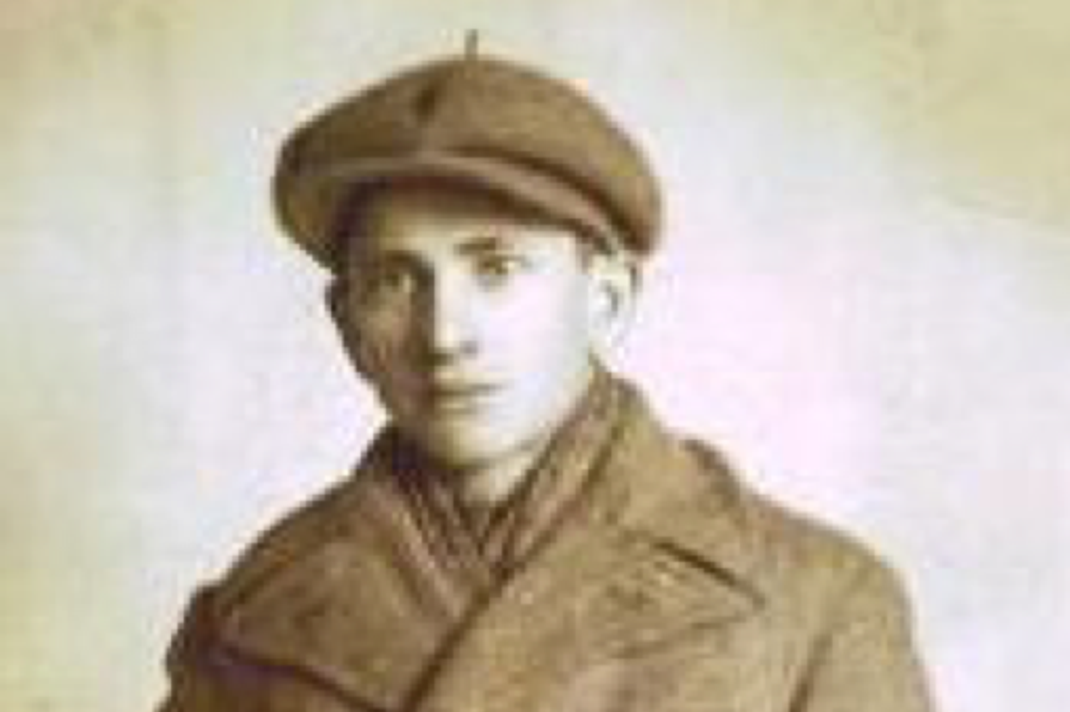
Leo’s Story
Leo Silverberg’s story was written by Bev Birkan using information drawn from his interview from the USC Shoah Foundation. Leo (né Leibusch Yankel Zylberberg) was born in Łagów, Poland, in 1917. During the war, Leo’s survival depended on his tailoring skills. In Sandomierz, he was able to do work for German officers and Jewish policemen, which protected him from deportation for a time. After his work brigade was relocated to a forced labour camp in Pionki, Leo continued to use his skills, but when he and his friends saw the SS arriving, they suspected the camp would be liquidated, so they escaped into the forest. During the winter of 1943–1944, Leo and his friends hid in the forest with the partisans. They remained there until the Soviets liberated the area. The following excerpt is from Leo’s escape and his time with the partisans.
As the Soviet army got closer to the Pionki camp, more German soldiers, police and SS arrived. Leo and others began to suspect that the prisoners were going to be either relocated or shot, so Leo decided that it would be a good time to escape and join the partisans. The German guards and police were always watching, but if they left from where they worked, the distance to the woods would be much shorter.
Leo and a friend decided to make a run for the woods from work. As they were leaving, a Jewish policeman asked where they were going. When they told him, he asked if he could join them. If they were caught, he said, he would tell the Germans he was bringing them back to the camp.
The three made their getaway in the winter of 1943–1944 with German soldiers and police shooting at them. They weren’t dressed for the cold and had no tools to help them build a shelter. They managed to escape their trackers, moving stealthily through the forest for eight days until they met a Polish man who had offered to help them in the camp. They were wet, cold and hungry after hiding in rivers and under trees without food. The young Polish man took Leo and his companions to his father’s barn and hid them in the loft where the hay was stored for the horses. They stayed in the barn for several days to dry out and rest up. The young man also gave them an old rifle — something one needed to join the partisans.
The young man had an older brother who was antisemitic and threatened Leo and his friends. When the father of the two sons saw what was going on, he told his older son that if he touched Leo or his companions, he, the father, would kill him. He said, “I’ll shoot you myself.” After that incident the older brother left them alone.
For six months Leo and his friends lived, worked, ate and slept alongside the partisans, trading for food in the forest and nearby towns. There were some good people who helped the partisans by exchanging valuables for food. As a partisan, Leo received three slices of bread a day. Living conditions were difficult and food was very scarce. At night, he had to build a fire to get hot water to wash his clothes and then dry them on a bush or tree. The clothes would dry hard as a board — frozen by the cold air — and he would have to put his clothing back on in its frozen state.
To survive in the forest, one had to stay strong and healthy. Leo wanted to survive so he could tell the world what he went through and what atrocities his fellow Jews went through. He often wondered if there was a God.
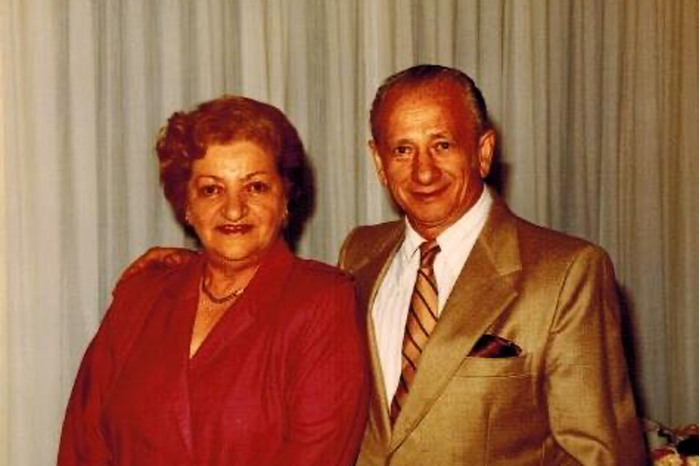
Elizabeth and Leo. Place and date unknown.
Elizabeth, right, with her Sustaining Memories writing partner Bev Birkan. Toronto, 2013.

